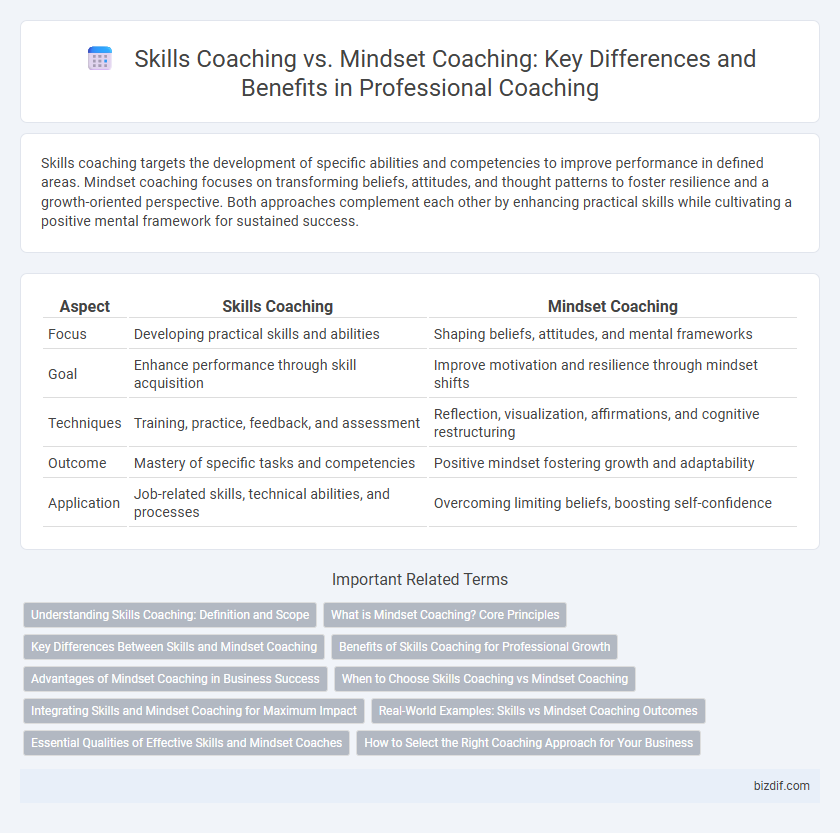Skills coaching targets the development of specific abilities and competencies to improve performance in defined areas. Mindset coaching focuses on transforming beliefs, attitudes, and thought patterns to foster resilience and a growth-oriented perspective. Both approaches complement each other by enhancing practical skills while cultivating a positive mental framework for sustained success.
Table of Comparison
| Aspect | Skills Coaching | Mindset Coaching |
|---|---|---|
| Focus | Developing practical skills and abilities | Shaping beliefs, attitudes, and mental frameworks |
| Goal | Enhance performance through skill acquisition | Improve motivation and resilience through mindset shifts |
| Techniques | Training, practice, feedback, and assessment | Reflection, visualization, affirmations, and cognitive restructuring |
| Outcome | Mastery of specific tasks and competencies | Positive mindset fostering growth and adaptability |
| Application | Job-related skills, technical abilities, and processes | Overcoming limiting beliefs, boosting self-confidence |
Understanding Skills Coaching: Definition and Scope
Skills coaching targets the development of specific competencies and practical abilities necessary for performing tasks effectively in professional or personal contexts. It emphasizes measurable outcomes such as technical expertise, problem-solving, and communication skills through structured feedback and targeted exercises. This form of coaching enhances performance by building concrete skill sets aligned with an individual's goals and job requirements.
What is Mindset Coaching? Core Principles
Mindset coaching centers on transforming an individual's beliefs, attitudes, and thought patterns to unlock their full potential and overcome limiting barriers. Core principles include fostering self-awareness, cultivating a growth-oriented perspective, and reinforcing resilience through deliberate mental shifts. This approach improves emotional intelligence and decision-making, driving sustainable personal and professional growth.
Key Differences Between Skills and Mindset Coaching
Skills coaching targets the development of specific abilities and technical competencies, emphasizing actionable strategies and measurable outcomes, whereas mindset coaching focuses on transforming underlying beliefs, attitudes, and mental frameworks to foster personal growth and resilience. Skills coaching is typically task-oriented, addressing performance in particular areas such as communication, leadership, or technical expertise, while mindset coaching cultivates self-awareness, confidence, and adaptability. Both approaches play complementary roles in holistic coaching, with skills coaching driving proficiency and mindset coaching sustaining long-term behavioral change.
Benefits of Skills Coaching for Professional Growth
Skills coaching enhances professional growth by improving specific abilities such as communication, leadership, and technical expertise, leading to increased job performance and career advancement. It provides targeted feedback and practical strategies, enabling employees to adapt to industry changes and meet organizational goals effectively. Consistent skills development fosters confidence, productivity, and long-term success within competitive work environments.
Advantages of Mindset Coaching in Business Success
Mindset coaching enhances resilience, adaptability, and problem-solving skills, which are critical for navigating the complexities of business environments. Cultivating a growth-oriented mindset leads to improved leadership, increased motivation, and sustained performance under pressure. This approach fosters long-term success by aligning personal values with business goals, driving innovation and effective decision-making.
When to Choose Skills Coaching vs Mindset Coaching
Skills coaching is ideal when individuals require specific knowledge or technical abilities to improve job performance, such as mastering software tools or developing sales techniques. Mindset coaching suits situations where overcoming limiting beliefs, building resilience, or enhancing motivation is crucial for personal growth and long-term success. Selecting the right coaching approach depends on whether the focus is on acquiring concrete competencies or transforming internal attitudes and perspectives.
Integrating Skills and Mindset Coaching for Maximum Impact
Integrating skills coaching with mindset coaching enhances overall performance by addressing both practical abilities and underlying thought patterns that drive behavior. This combined approach fosters sustainable growth, as developing technical skills alongside a growth-oriented mindset empowers individuals to overcome challenges more effectively. Organizations that adopt this holistic strategy report higher engagement, improved problem-solving, and accelerated personal and professional development.
Real-World Examples: Skills vs Mindset Coaching Outcomes
Skills coaching focuses on developing specific competencies such as public speaking, time management, or technical abilities, leading to measurable improvements in job performance and productivity. Mindset coaching targets attitudes and beliefs, fostering resilience, growth mindset, and emotional intelligence, which result in enhanced motivation, adaptability, and long-term personal development. Real-world examples include software developers who increased coding efficiency through skills coaching and entrepreneurs who overcame fear of failure and scaled businesses via mindset coaching.
Essential Qualities of Effective Skills and Mindset Coaches
Effective skills coaches demonstrate deep expertise in specific competencies, utilize targeted feedback techniques, and apply structured development plans to enhance client performance. Mindset coaches excel in empathy, emotional intelligence, and fostering resilience, guiding clients to overcome limiting beliefs and cultivate a growth-oriented perspective. Both types of coaches prioritize active listening, adaptability, and strong communication skills to tailor their approach and support sustainable personal and professional growth.
How to Select the Right Coaching Approach for Your Business
Skills coaching concentrates on enhancing specific competencies and practical abilities essential for job performance, while mindset coaching targets beliefs, attitudes, and motivations that drive behavior and decision-making. To select the right coaching approach for your business, assess whether your challenges stem from skill gaps or limiting mindsets and prioritize accordingly for tailored growth. Integrating performance metrics and employee feedback can guide an effective choice between skills and mindset coaching strategies.
Skills coaching vs mindset coaching Infographic

 bizdif.com
bizdif.com